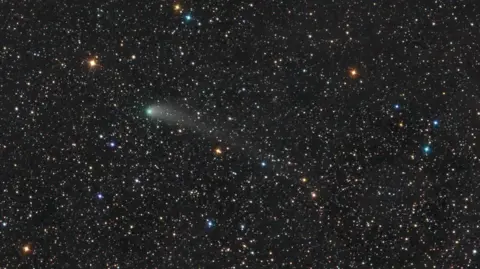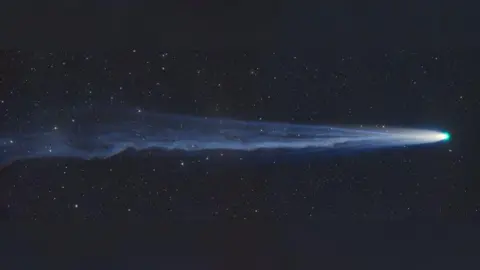Stargazers urged to photograph rare comet
 University of Reading/Damian Peach
University of Reading/Damian PeachStargazers are being urged to photograph a comet due to pass Earth that may be missing its tail.
Researchers at the University of Reading said comets are like cosmic "windsocks" because they can indicate the strength and direction of solar wind - streams of charged particles from the sun that can damage technology on Earth.
Scientists can use photos of this comet - which is passing Earth in February and March - to determine the solar wind conditions, especially if the tail detaches.
Sarah Watson, the PhD researcher leading the project, said learning about solar wind can help scientists forecast it and limit the resulting harm.
The comet - known as C/2021 S3 Pannstars - does not pose a danger to Earth and will be about as far away as the sun, the university said.
It has been in the night sky from Wednesday 14 February, but it will be easier to spot in the coming weeks as it appears further from the sun and will stay above the horizon for longer - although it is still not visible with the naked eye.
 University of Reading/Gerald Rhemann
University of Reading/Gerald RhemannAstronomers will need a camera with a large lens, or a small telescope they can attach to their device in order to capture a quality image.
The charged particles in solar wind can damage satellites, harm astronauts, and, if they hit the Earth's magnetosphere, cause communications to go "haywire", the university said.
A comet's head detaching is "a rare sight", Ms Watson said, and could allow the team to determine whether there was an increase in solar wind activity.
"We need lots of timed photos of the comet to build up a picture of its journey through our solar system," she said.
"This is a fantastic opportunity for amateur astronomers to get out their telescopes, capture a truly spectacular cosmic moment and make a big contribution to some important science."
The comet is expected to be visible until the end of March.
Anyone who captures the comet has been urged to send them to Ms Watson via the university.
Follow BBC South on Facebook, Twitter, or Instagram. Send your story ideas to [email protected].
